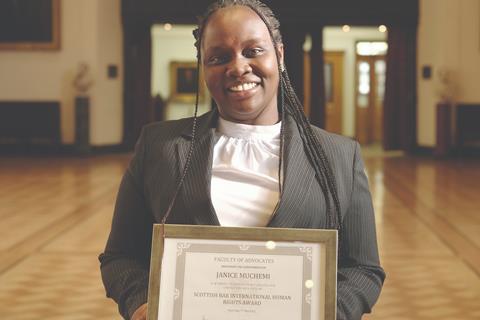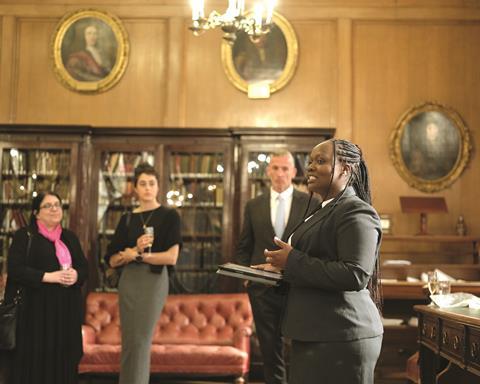Award-winning human rights lawyer Janice Muchemi explains how her Christian faith motivated her to keep campaigning for justice, even when the odds were stacked against her

When Janice Muchemi joined Christian NGO International Justice Mission (IJM) aged 23, she faced a brutal introduction to the world of criminal litigation.
Founded in 1997, IJM works all over the world to rescue and restore victims, but also bring criminals to justice through the courts. The group often takes on cases related to violence against women and human trafficking.
“I was given a child, aged four years old, who had been defiled by her father,” says Muchemi, who joined their team in Kenya as an intern, aged just 23 years old. It was a harrowing case, but in walking with the young girl from trauma to restoration, Muchemi was convinced God had placed her exactly where he intended her to be.
Over the year that followed, she continued to grow into the work, both emotionally and spiritually – and it wasn’t long before she encountered a colleague whose passion would profoundly shape her future.
Willie Kimani also worked at IJM and was beginning to establish a new area of focus within the organisation – fighting police brutality and the abuse of power. “He was pioneering this project,” says Muchemi, “and he wanted us to get on board.”
According to IJM, one in three Kenyans have experienced police abuse or harassment. Historically, police officers have bribed, abused, falsely accused, imprisoned and even killed citizens with little fear of any consequences. People living in poverty are often defenceless against these crimes. Kimani was urging his colleagues to join him in confronting this injustice and demanding change.
Tragedy strikes
Then, in 2016 – just one year after Muchemi had joined IJM, and while she says the initiative was still “fresh” – Kimani was abducted by the very forces he was working to hold accountable. He had just left a Nairobi courtroom, where he was representing Josephat Mwenda, a man who had been shot by police. Kimani, Mwenda and their taxi driver, Joseph Muiruri, were tortured and killed – by police.
Kimani’s death confirmed the severe reality that he’d been urging his colleagues at IJM to help him confront. “When we lost Kimani, our friend and our client, we got to see through his eyes what he wanted us to see all along,” she says. “We were able to see the abuse that people were going through.”

Kimani’s tragic murder was the catalyst Muchemi needed. She had already spent her career pursuing justice for vulnerable people with no one else to advocate for them. “To us, it’s a case,” she says. “But to a client, it is their life – and when you get a conviction, it is validation for a victim.” But now Muchemi found herself in the unique position of both the advocate seeking justice and the friend who desperately needed it.
Before Kimani’s case, IJM had only ever managed to bring two police officers to court, and neither cases had resulted in a conviction. Now, Muchemi was leading a case not just against individual officers, but an entire police unit. The unit was specifically created to handle covert operations but was regularly violating the human rights of the very people they were supposed to protect.
“There was a lot of fear around that,” she admits. “We’re not dealing with the officers in the dock; we’re dealing with an entire structure.”
Muchemi and her team had to develop a full security strategy: personal safety training, situational awareness and emergency protocols. Such was the risk of holding these authorities to account.
Justice for Kimani
After an emotionally exhausting seven years in court, four police officers were found guilty of murdering Kimani, his client and his taxi driver. The ringleader was sentenced to life imprisonment.
When the convictions finally came and justice was won, it meant more than validation. “I could finally breathe,” Muchemi says. “I couldn’t imagine coming back to IJM with a negative decision. Willie was one of us.
“When that judgment was read, the family all started crying,” she continues. “It’s like your life is put on hold, and you focus on this traumatic event for so long – but when it finally comes to an end, it’s a celebration.”
Strength to bear
The conviction that God is at work even among the hardest of situations has long grounded Muchemi in her work, giving her the strength to face circumstances that many would find difficult. “Our faith is what keeps us going,” she says. “Today you might get a win – but then someone else is shot on the street. You feel like you’re moving forward, and then something happens and you realise…no, not yet.
“Sometimes you just ask: What is happening?” she continues. “But that’s why the spiritual helps us. There are things we can’t explain, but we know God is doing something behind it.”
Faith remains her foundation, as do two simple convictions drawn from her work that now guide her everyday life: God’s supremacy – and the belief that, if you can help someone, you should.
“If you have a role to play that can better someone’s life – do it. And don’t expect anything in return,” she says. “The reward comes from God.”
Amid all of the sorrows of a job in which “every time we interview clients, it’s either a mother or a widow crying”, the reward for Muchemi and her team is this: painfully won progress.
According to Kenyan charity Missing Voices, more than 1,350 people have been victims of extrajudicial killings and enforced disappearances since 2019. Nonetheless, the team at IJM are seeing progress.
“The time for trials has come down, and we’re working to rid it of corruption so that the vulnerable can access justice, even if they don’t have the resources to do so. In all the sectors of the system we’re intervening in, we’re seeing good progress.”
For Muchemi, that’s more than enough to find purpose in the work she’s doing, however costly it may be.






































No comments yet